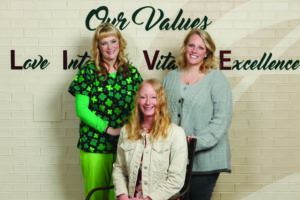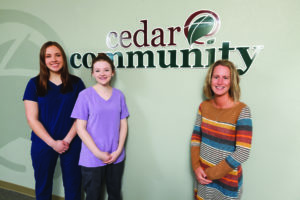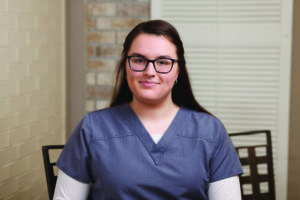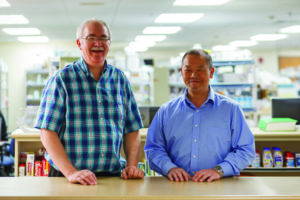Cedar Community Provides Valuable On-the-Job Training to Nursing and Pharmacy Students

Nicki Nass, Jessica Melstrand, and Heather Suarez Del Real work together to educate the next generation in a clinical setting.
For many people, the best way to learn something is by doing. With careers that are hands-on, such as nursing, on-the-job training is crucial. Cedar Community — a UCC-related older adult community in West Bend, Wis. — works with local colleges, high schools, and organizations to provide valuable, real life training opportunities for students. Working closely with Moraine Park Technical College (MPTC), Concordia University, the University of Wisconsin-Milwaukee, the University of Wisconsin-Madison, and local high schools, Cedar Community provides clinical experience and preceptorships in not only nursing, but pharmacy.
Students at the college level participate in several clinical opportunities in a supervised setting with fellow students and an instructor. Cedar Community also offers a preceptor program which is a one-to-one relationship between an experienced registered nurse and a nursing student. MPTC requires 80 clinical hours and Concordia University requires 126 hours, along with supervision from a four-year degreed registered nurse. “The preceptor program allows students, who work with the same nurse throughout their required hours, to really learn the role of a nurse in a skilled care environment. It also helps them decide if they are on the right nursing career path and this type of nursing is something they want to continue after graduation,” says Heather Suarez Del Real, RN, Cedar Community’s Director of Nursing. Cedar Community typically hosts one to two senior level MPTC nursing students in their last semester of school, in long- and/or short-term care. While Concordia students have an opportunity to work with a four-year degreed registered nurse in Cedar Community’s long- and/or short-term care, or hospice.
Nursing students from MPTC, Concordia University, and the University of Wisconsin-Milwaukee complete their clinicals under the supervision of the classroom instructor both on long- and short-term units in the skilled facility, as well as in the independent living setting. Clinicals provide students an opportunity to fine tune their skills while working with an instructor who can answer questions and supervise.
While both the preceptor program and clinicals allow students to learn more about the long- and short-term levels of care, the preceptor is an in-depth opportunity to hone in on valuable nursing skills. “Working alongside a nurse, doing what she is doing, learning the true ins and outs of their day, really gives students first-hand experience of what it is like to be a nurse in this type of environment,” says Suarez Del Real. “They develop a relationship with the nurse while learning the pros and cons of long- and short-term care, and are immersed in the day-to-day of caring for multiple residents with a wide range of needs.”

Cheryl Manthea (rights) helps students through the process.
Working in a skilled nursing environment allows a nurse to fine tune their assessment and communication skills and autonomy because there is not always a practitioner onsite to rely on. “They have to learn how to make a good resident assessment and communicate to the practitioner, sometimes over the phone, and figure out the next step of care,” Suarez Del Real adds. “They are developing their skills and gaining confidence to do things on their own, versus working in a clinical group with several other students and an instructor to rely on.”
Nikki Nass, a Registered Nurse at Cedar Community, has served as a preceptor for several years. “I love being able to share my love and passion for the geriatric population,” says Nicki. “The biggest misconception I’ve heard students say in the past is that it’s nothing but ‘pushing med carts and passing pills all day,’ which is the furthest from the truth. It’s really so much more — it’s a specialty. You have to have a level of understanding, patience, and a special personality to work with this population.”
“You work with a large population all at once, many with an increased number of comorbidities, some acute and chronic, so there is a vast spectrum of care provided,” she adds. “The geriatric population brings everything you learn in nursing school full circle. It is fast paced and students learn the importance of prioritizing and delegation. The scenarios faced everyday are about choices of what to do and when. I love to watch them grow as a new nurse. The wide-eyed look on their faces on the first day when I tell them they will get to know and care for 30+ people is classic, and a lot different than their usual student case load of two to three patients at a time. When they have achieved this by their last clinical day with me, it’s priceless.”
Cedar Community is also working with Concordia University offering a preceptorship in hospice. “Cedar Community is unique because we have the time to walk through and explain the hospice nursing process and every aspect of hospice care. For some people this could be their first exposure to death. Working side-by-side with a hospice registered nurse can help a student process the whole life cycle more realistically,” says Jessica Melstrand, BSN, RN, administrator of Cedar Community Home Health and Hospice. With many years of hospice experience, Jessica says it’s an honor to be a part of a patient’s end of life and, as a nurse, it helps you realize your strengths and weaknesses, but at the same time being strong for the patient and family, while being confident in your skills and knowledge.
Cedar Community also coordinates with local high schools, serving as a clinical site for the schools’ nursing assistant training classes, and also with CESA 6, a youth apprenticeship program. The program allows employers to meet and interview students, enrolled in the program for open positions.

Adelina, a certified nursing assistant, appreciated the nature of the program.
When interviewed, the students share their grade point averages, teacher recommendations, and attendance records. Students participating fulfill 450 hours and receive a certification. “The program is a win-win situation for the student and employer. It teaches the student employment and social skills, and the opportunity to learn the skills needed to work in a long-term care environment. It also helps fulfill openings at Cedar Community with individuals interested in pursuing a nursing career,” says Cheri Manthei, HR supervisor. Students are reviewed by their Cedar Community supervisor on attendance, attitude, reliability, accuracy, initiative, flexibility, critical thinking, communication, teamwork, and workplace standards. They receive high school credit and a grade for the class. Cedar Community has been actively involved in the youth apprenticeship, and has hired over 10 students, many who still work here even after they head off to college, working during school breaks.
Students have responded positively to the program and appreciate the opportunity to learn and enhance their skills. “It was a great chance for me to see if nursing is something I really wanted to pursue,” says Maria, a Cedar Community resident assistant. “It’s a jump start to my nursing career while allowing me firsthand experience; something you can’t get in the classroom. It also helps me develop my communication, leadership, and time management skills,” says Allison, a Cedar Community Resident Assistant. “I am able to connect with residents on a personal level and build a relationship while assisting them with their needs,” says Adelina, Certified nursing assistant.
In addition to nursing, Cedar Community also offers educational opportunities for pharmacy students. Cedar Community’s Director of Pharmacy Mark Selle, RPh, has been a preceptor for almost 40 years through the University of Wisconsin-Madison School of Pharmacy. The program has been offered by Cedar Community for nine years. Each year, four-to-six University of Wisconsin-Madison pharmacy students spend one to two eight-hour days per week working alongside Mark and fellow pharmacist Sam Vang, PharmD, learning how to look at a medication profile for interactions and allergies and monitoring medications. Also, most importantly, they learn how to communicate with a senior population. “Cedar Community offers a unique learning site because we have everything from ambulatory to assisted living and long-term care, with a wide range of situations and ages,” says Vang. “We also spend time with them teaching and interacting. They are not just observing our work. We give them situational questions and ask how they would approach it.”

Pharmacy instructors Mark Selle and Sam Vang enjoy working with the students.
Several student follow-up surveys have highlighted the outstanding opportunities experienced by pharmacy students. Said one student, “I had an amazing experience. Not only did I learn a lot from my preceptor, but the entire staff of pharmacists, techs, and nurses did everything they could to teach me throughout the day. I couldn’t have asked for a better location.”
“The site went above and beyond to accommodate students and prepare activities to enhance our learning,” said a second student. “Opportunities to speak with patients and discuss medication assessments and recommendations with other students of different years was extremely engaging and beneficial.”
Another student called it the “best preceptor I’ve had so far. It wasn’t just students following and watching. Instead, the pharmacist devoted nearly all his time to teaching and guiding us to think critically, exposing us to direct patient interaction, and ensuring we got the very most out of our time. I am sad it was only a short rotation because this was the most valuable and influential preceptor I’ve had yet.”
Reprinted with permission from the Cedar Community Live More magazine.
Join Our Mailing LIst
"*" indicates required fields
